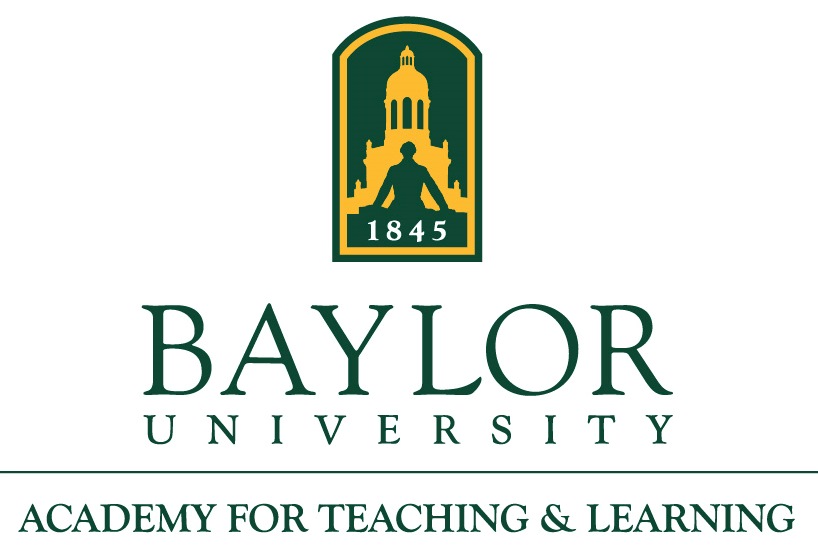Ten Baylor University Faculty Members Elected as Fellows for Teaching Excellence

Pilot ‘blended learning’ program will mark the fifth anniversary of the Fellowship program
Follow us on Twitter:@BaylorUMedia
Contact: Terry Goodrich, (254) 710-3321
WACO, Texas (April 27, 2016) — Ten faculty members have been elected to serve as 2016-17 Baylor Fellows because of their excellence in teaching and desire to transform student thinking through innovation.
The fellowship program, begun in the fall of 2011, is sponsored by Baylor’s Academy for Teaching and Learning (ATL). Selected faculty members receive an honorarium of $1,845 in honor of Baylor’s founding and the title of “Baylor Fellow” for the year of their appointment.
To mark the fifth anniversary of the Baylor Fellows Program and further encourage teaching innovation across campus, ATL will partner with the Office of the Executive Vice President and Provost to designate the 2016-17 Baylor Fellows as participants in a pilot Blended Learning Program as an experimental pedagogical endeavor.
The Fellows are:
The pilot program will be directed by Wes Null, Ph.D., vice provost for undergraduate education, and managed by the Academy for Teaching and Learning with support from the Faculty Senate, Student Senate, Faculty Regent, Student Regent, University Libraries and the Teaching, Learning, and Technology Committee.
The “blended” or “flipped” class refers to the introduction of course material outside of class time, often via brief video lectures, and the application and assimilation of course material during class time, perhaps through problem-solving activities, class discussion or case-study analysis. Students will spend time outside of class on lower-level cognitive functions (knowledge acquisition and comprehension) and class time on higher-order cognitive functions (application, analysis, synthesis, and/or evaluation). The flipped class inverts the traditional model of teaching and learning in which initial exposure to course material occurs in class through lecture, and application and assimilation of information occurs outside of class through homework.
Baylor Fellows will have the freedom to choose the methods and means for doing so. Some Fellows may choose to use technology to flip their classes; i.e., some will capture and post lectures digitally for students to view outside of class. Others will design and assign pre-class activities that will introduce material before class meetings to be examined in class, such as reading and journal writing before class, small-group activities and large-group discussion during class. The ATL and University Libraries will assist faculty with their technological and teaching needs, while the Institutional Research and Testing (IRT) office will provide assessment support.
The primary aim of the Baylor Fellows program is to recognize outstanding teachers across the disciplines and give them the opportunity to experiment with new teaching approaches to deepen student engagement with ideas, course material and disciplinary thought patterns. Baylor Fellows are asked to identify one course to serve as their “incubator” or “lab” classroom. They then develop activities and assignments to foster effective thinking among students.
A secondary program aim is to provide a forum in which Baylor Fellows can share their efforts to foster effective thinking. Discussions are held monthly. All full-time faculty members, regardless of rank, are eligible to serve as Baylor Fellows.
In the selection process for Fellows in the pilot program, academic deans, previous Baylor Fellows and members of the ATL Advisory Council submit nominations, which are reviewed by the provost and director of the ATL, who will select Baylor Fellows.
As a result of the fellowship experience, Baylor Fellows will be invited to contribute to the ATL and Baylor by:
ABOUT BAYLOR UNIVERSITY
Baylor University is a private Christian University and a nationally ranked research institution. The University provides a vibrant campus community for more than 16,000 students by blending interdisciplinary research with an international reputation for educational excellence and a faculty commitment to teaching and scholarship. Chartered in 1845 by the Republic of Texas through the efforts of Baptist pioneers, Baylor is the oldest continually operating University in Texas. Located in Waco, Baylor welcomes students from all 50 states and more than 80 countries to study a broad range of degrees among its 12 nationally recognized academic divisions.